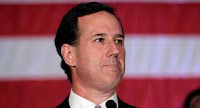Because the front runners of the Republican candidates are
equally flawed, you might as well vote for your favorite long-shot candidate.
 Trump is no more dependably conservative than Romney was.
The biggest difference between Trump and Romney is the 216 miles between I-95
that separates New York from Boston. The next biggest difference between them
is that Trump is the wolf that barks the louder. And he wears a finer wool
blend.
Trump is no more dependably conservative than Romney was.
The biggest difference between Trump and Romney is the 216 miles between I-95
that separates New York from Boston. The next biggest difference between them
is that Trump is the wolf that barks the louder. And he wears a finer wool
blend.Cruz has most of the conservative bona fides. What he lacks is leadership. He seems to have been a pretty good litigator, but despite his big talk about stopping the Obama agenda, he was not even able to impact McConnell’s Senate, let alone slow down the Obama agenda. Cruz and a dozen other conservatives could have had a major influence on McConnell’s Senate if a leader had emerged to make the difference. People’s anger is high because people make promises to get elected to Washington but then fail to deliver, and Cruz is the premier example.

So, there you have it. Vote for the erratic Donald Trump who is yet another conservative of convenience like Romney, or vote for a big talking freshman senator who hasn’t yet delivered. Trumps problems offset Cruz’s failures. Both men are equally flawed candidates. If the nomination is ultimately between these two, then why bother.
If neither of the front runners is better than the other, we might as well vote for the long-shot candidate, if the long-shot candidate is highly qualified and who is strongly committed to the conservative agenda.

In 1994, Rick Santorum came into the 435-member House of Representatives as a freshman congressman. He worked with seven other congressional delegates to expose the scandalous practices of the House Bank, working against nearly all incumbent representatives, including Newt Gingrich, but doing so in a way that made a huge impact on the House.


















